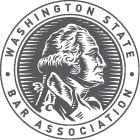Mentorship
You can earn Mandatory Continuing Legal Education (MCLE) credit for participating in an approved structured mentoring program. Per Washington Supreme Court Admission and Practice Rule (APR) 11, mentors and mentees now have the opportunity to receive one MCLE credit for every one hour engaged in an approved structured mentoring program. You can either earn credit by participating in an approved program or by developing your own self-directed program. Law and legal procedure credits are not available for participating in approved mentoring programs.
Standards for Approving Structured Mentoring Programs
The Washington Supreme Court sets minimum standards for approving structured mentoring programs. Recently, the MCLE Board decided to expand its policy to allow MCLE credit to those mentoring law students, those enrolled in the law clerk program, recent JD graduates, and inactive members who plan to be licensed in WA state when participating in certain approved structured mentoring programs. This policy expands the pool of participants who can be considered a mentee for MCLE credit purposes, but the requirement that a mentor be an active member of the bar for at least five years and in good standing remains unchanged. It also excludes self-directed mentoring programs as these programs do not have the degree of oversight that exists in mentoring programs devised and monitored by organizations that have sought and obtained approval from the Board. This policy change is set to go into effect 60 days from the date of its promulgation. Programs interested in becoming an approved structured mentoring program must submit an application (which also includes the most recent standards) as well as program materials and sample forms to the MCLE Board.
Mentoring Guide for Self-Directed Structured Mentoring
Licensed legal professionals wishing to develop their own self-directed structured mentoring program with a chosen mentor or mentee, must follow the guidelines in the Self-Directed Structured Mentoring Program Guide in order to obtain MCLE credit.
The Self-Directed Structured Mentoring Program Guide includes:
- Mentoring agreement
- Mentoring plan
- Mentoring evaluation
Once your program is complete, you may claim credit by submitting an online application with the above documents on the MCLE Online System.
Pro Bono Legal Service
You can earn MCLE credit for providing pro bono legal services through a qualified legal service provider (QLSP). QLSPs are listed here and are defined in Washington Supreme Court Admission and Practice Rule (APR) 1(e)(8). Law and legal procedure credits and ethics credits are not available for providing pro bono legal service.
Yearly, you may claim one credit for every hour of pro bono legal service provided through a QLSP by submitting an online application via the MCLE Online System.
Note : Any discrepancy or conflict between the information provided here and the rules and regulations set by the Washington Supreme Court, or the Bylaws and policies of the Washington State Bar Association, is unintentional and will be resolved in favor of strict compliance with the rules, regulations, Bylaws and policies.






